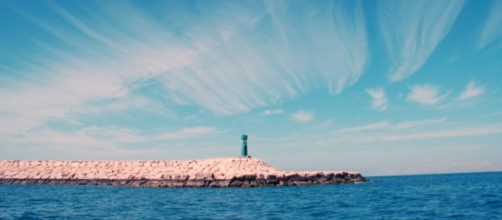An emergency centre for refugees from Turkey on the Greek island of Lesvos is to benefit from funding from British agencies, it was announced today.
Although the crossing is only 15km, it is dangerous, and attracts refugees because of the beam from the Pharos lighthouse.
Once on European soil, the refugees can then apply for asylum, but the shore is rocky, making it difficult to land there, and even when they do, it is a further six-hour walk to the nearest town.
Now, two dilapidated buildings next to the lighthouse are to be converted and a kitchen as well as a changing room will be incorporated.
A makeshift tent will be erected to provide shelter for those making the hazardous crossing.
But the volunteers, who will work round-the-clock at the new centre, will also be supplied with ropes to help those arriving navigate the rocks they will face on their arrival.
Other equipment being supplied includes wetsuits, night vision binoculars and equipment for Children and babies.
A spokesman for the new initiative said that although it was small, it was ‘highly significant’ and would be of benefit to hundreds of refugees.
The Anglican Diocese in Europe has said that it will provide funding for the new emergency reception centre, and it comes days after 86 Church of England bishops wrote to Prime Minister David Cameron criticizing him for his approach to the refugee crisis.
David Cameron has said that the UK will take in 20,000 refugees between now and 2020, however, the bishops said that was too little, instead urging that Britain take in 50,000.
It was revealed today that Downing Street had responded to their letter but only to maintain the Government’s stance.
The issue has caused concern across the EU, with German Chancellor Angela Merkel facing a backlash after she said that refugees should be welcomed.
Her country is the largest recipient of refugees, and dwarfs the response of the British government.
An EU summit this week focused on the situation in the Balkans as many refugees are travelling through those countries in order to register in northern European states. Suggestions that Balkan states stop refugees moving through and register in those countries instead sparked a dispute as EU leaders met on Sunday.
Most refugees arriving in European states are from Syria, Iraq and Afghanistan.

